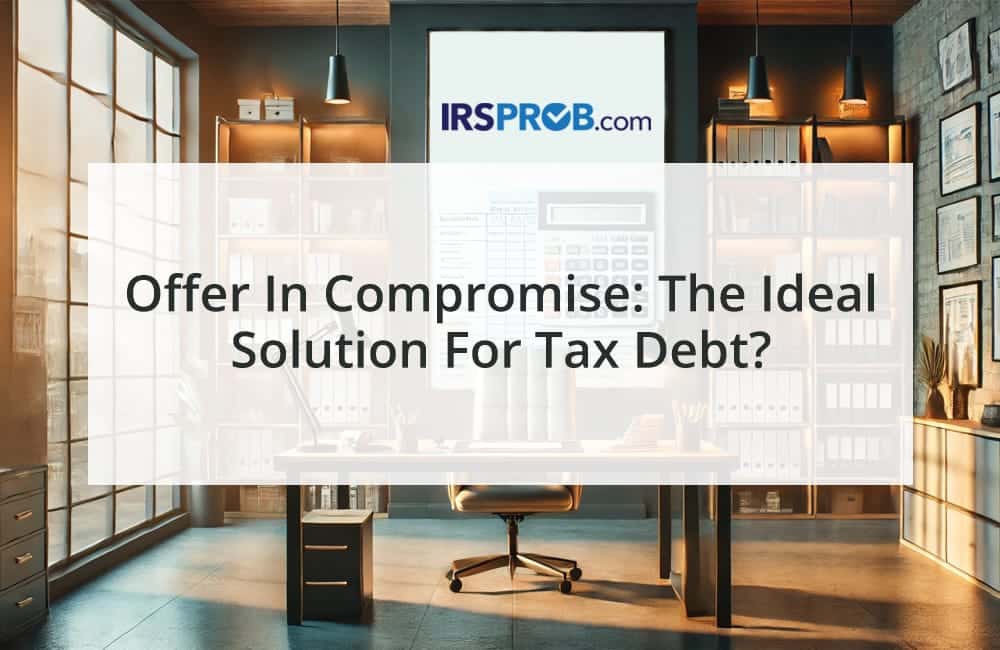Unraveling the Tax Debt Gordian Knot: Is an Offer in Compromise Your Golden Ticket?
Picture this: you’re drowning in a sea of tax debt, gasping for air, and desperately searching for a lifeline. Enter the Offer in Compromise (OIC), the IRS’s version of a “Get Out of Jail Free” card. But is it really the panacea for all your tax troubles? Let’s dive into this financial rabbit hole and see if we can find the proverbial white rabbit.
First things first, what exactly is an Offer in Compromise? In layman’s terms, it’s a deal you strike with the IRS to settle your tax debt for less than what you owe. Sounds too good to be true, right? Well, hold your horses, because it’s not as simple as walking into the IRS office with puppy dog eyes and a sob story.
The OIC program is designed for taxpayers who are genuinely unable to pay their full tax liability. It’s not a get-rich-quick scheme for tax evaders or a loophole for the wealthy to exploit. The IRS takes these applications seriously, scrutinizing every detail of your financial situation with the intensity of a forensic accountant on a caffeine high.
Decoding the OIC Enigma: A Deep Dive into the Taxman’s Treasure Chest
Now that we’ve dipped our toes into the OIC waters, let’s take a deep dive into the nitty-gritty details. There are three types of Offer in Compromise: Doubt as to Collectibility, Doubt as to Liability, and Effective Tax Administration. Each has its own set of criteria and complexities, much like a tax-themed Choose Your Own Adventure book.
Doubt as to Collectibility is the most common type of OIC. It’s for taxpayers who can prove they don’t have the means to pay their full tax debt. The IRS will look at your income, expenses, and assets with a fine-toothed comb. They’ll calculate your “reasonable collection potential” – a fancy term for how much they think they can squeeze out of you over time.
Doubt as to Liability is the unicorn of OICs. It’s rare and only applies when there’s a genuine dispute about the amount of tax debt owed. If you’re going this route, you’d better have iron-clad evidence and nerves of steel, because you’re essentially telling the IRS they made a mistake. Bold move, Cotton.
Effective Tax Administration is the compassionate cousin of the OIC family. It’s for situations where you can technically afford to pay your tax debt, but doing so would cause significant economic hardship or be unfair due to exceptional circumstances. Think medical emergencies, natural disasters, or other life-altering events that would make Even Steven Jobs sympathetic.
IRSProb: Your Local Tax Debt Superhero in the Lone Star State
Now, you might be thinking, “This OIC business sounds more complicated than quantum physics. How am I supposed to navigate this labyrinth?” Enter IRSProb, your friendly neighborhood tax relief experts in the great state of Texas.
Why choose a local company like IRSProb over some faceless national chain? Well, pardner, let me tell you. IRSProb knows the lay of the land in Texas better than a cowboy knows his horse. They understand the unique economic challenges faced by Texans, from oil boom-and-bust cycles to the impact of natural disasters like hurricanes.
But it’s not just about local knowledge. IRSProb brings a personal touch to the table that you won’t find with big, impersonal firms. They’re not just number crunchers; they’re your neighbors, your fellow Texans who genuinely care about helping you get back on your feet. They’ll take the time to understand your individual situation and craft a tailored solution that fits you like a custom-made cowboy boot.
Moreover, IRSProb has a track record of success that would make even the toughest rodeo champion tip their hat. They’ve helped countless Texans wrangle their tax debt into submission, using their expertise to navigate the complex OIC process with the skill of a seasoned trail guide.
The Texas Tax Tango: Why IRSProb Leads the Dance
When it comes to the intricate waltz of tax debt resolution, particularly in the realm of Offer in Compromise, IRSProb stands out as the Fred Astaire of the tax relief world. With their deep-rooted expertise in Texas tax law and a track record smoother than a well-oiled line dance, IRSProb has become the go-to partner for Texans looking to dip, twirl, and glide their way out of tax debt.
What sets IRSProb apart in the Lone Star State? For starters, their team of tax professionals knows the ins and outs of Texas tax regulations like the back of their cowboy-booted feet. This local knowledge, combined with their national-level expertise, allows them to craft Offer in Compromise solutions that are as tailored as a bespoke suit from a Dallas haberdasher.
But it’s not just about knowing the steps; it’s about leading with confidence. IRSProb’s approach to Offer in Compromise is both aggressive and strategic. They don’t just throw numbers at the IRS and hope for the best. Instead, they meticulously analyze each client’s financial situation, much like a champion chess player studying the board, to determine the most advantageous move. This calculated approach has resulted in a success rate that would make even the toughest rodeo bull rider tip their hat in respect.
Lassos and FAQs: Roping in the Facts About Offer in Compromise
Now, let’s wrangle some of the most common questions that tend to stampede through the minds of folks considering an Offer in Compromise. First up, “What exactly is an Offer in Compromise?” Well, partner, it’s not a Texas-sized barbecue offer from the IRS. It’s a program that allows qualified individuals to settle their tax debt for less than the full amount owed. Think of it as negotiating the price of a prize bull at the state fair – you’re aiming for a deal that both parties can shake hands on.
Next question in the corral: “Do I qualify for an Offer in Compromise?” This isn’t a one-size-fits-all Stetson situation. Qualification depends on various factors, including your income, expenses, asset equity, and ability to pay. IRSProb’s team of tax wranglers can assess your situation faster than a quickdraw contest to determine if you’re a good candidate for this program.
“How long does the Offer in Compromise process take?” Now, we’re not going to sugar-coat it like a funnel cake at the Texas State Fair – this process can take some time. Generally, it can range from several months to a year or more. But fear not, because IRSProb’s experts work faster than a prairie fire with a tailwind to expedite the process and keep you informed every step of the way.
Saddling Up: Your Next Move with IRSProb
So, you’ve decided to lasso your tax debt and reign it in with an Offer in Compromise. What’s your next move? Well, partner, it’s time to saddle up and ride on over to IRSProb. Your first step is to reach out and schedule a consultation. You can do this faster than a tumbleweed in a tornado by dialing their number at 866-861-4443. It’s easier than roping a stationary calf, and it’s the first step towards financial freedom.
During your initial consultation, IRSProb’s tax maestros will perform a comprehensive review of your financial situation. They’ll examine your assets, income, and expenses with the precision of a Texas Ranger investigating a high-stakes case. This thorough analysis is crucial in determining not only if you’re eligible for an Offer in Compromise, but also in crafting a proposal that has the best chance of being accepted by the IRS.
Once the groundwork is laid, IRSProb’s team will begin the process of preparing and submitting your Offer in Compromise. They’ll gather all necessary documentation, crunch numbers like a supercomputer at NASA’s Johnson Space Center, and draft a compelling proposal. Throughout this process, they’ll keep you informed and involved, ensuring you’re as comfortable as a cowboy in a new pair of boots. Remember, with IRSProb, you’re not just a client – you’re a partner in the pursuit of tax relief.









